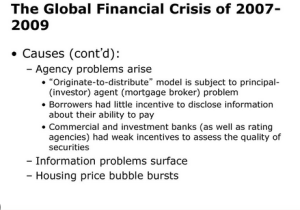Financial crises are complex events typically triggered by a combination of factors, and they can manifest in various forms, such as banking crises, currency crises, or sovereign debt crises. While each financial crisis is unique, several common causes and contributing factors are often identified:

What Causes Financial Crises
-
Table of Contents
ToggleAsset Bubbles and Speculative Behavior:
- Overvaluation of Assets: Excessive speculation and overvaluation of assets, such as real estate or stocks, can create bubbles. When these bubbles burst, it can lead to significant financial losses and trigger a crisis.
-
Excessive Leverage:
- High Debt Levels: When financial institutions, corporations, or households take on excessive debt, they become vulnerable to economic downturns or changes in interest rates. High levels of leverage can amplify financial stress.
-
Global Economic Imbalances:
- Trade Deficits and Surpluses: Persistent global imbalances, such as large trade deficits in some countries and surpluses in others, can lead to capital flows that contribute to financial instability.
-
Macroeconomic Factors:
- Recessionary Pressures: Economic downturns can strain financial systems, leading to an increase in defaults and financial stress.
- High Inflation or Deflation: Rapid inflation or deflation can disrupt economic stability and negatively impact financial institutions and markets.
-
Policy Missteps:
- Monetary Policy Mistakes: Central banks implementing inappropriate monetary policies, such as keeping interest rates too low for too long, can contribute to asset bubbles and imbalances.
- Regulatory Failures: Inadequate or poorly enforced regulations can allow excessive risk-taking and fraud to go unchecked.
-
Political and Geopolitical Events:
- Political Instability: Political uncertainty or instability can erode investor confidence and contribute to capital flight.
- Geopolitical Tensions: Global geopolitical events, such as conflicts or trade disputes, can create uncertainty and disrupt financial markets.
-
Global Financial Integration:
- Contagion Effects: The interconnectedness of global financial markets means that problems in one part of the world can quickly spread to others, leading to contagion effects.
-
Sudden Shifts in Market Sentiment:
- Loss of Confidence: A sudden loss of confidence in financial markets or specific institutions can trigger panic selling and exacerbate a crisis.
-
Natural Disasters and External Shocks:
- Unforeseen Events: Natural disasters, pandemics, or other unforeseen events can have profound economic and financial consequences, leading to a crisis.
-
Technology and Market Complexity:
- Algorithmic Trading and High-Frequency Trading: Technological advancements and complex financial instruments can contribute to rapid and unpredictable market movements.
Financial crises are often the result of a combination of these factors, and their precise causes can vary across different episodes. Effective crisis prevention and management involve robust regulatory frameworks, prudent risk management practices, and coordinated policy responses at both national and international levels.
